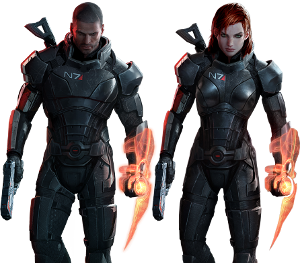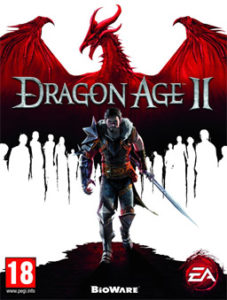I am an avid gamer, as many folks are. Over the years I’ve come to focus primarily on strategy games and role playing games, with the draw of both being the story that unfolds out as you play.
This is especially true for the role playing games produced over the years by Bioware. Bioware has a knack for combining winning gaming systems with engrossing stories that has kept me involved in their products for more than twenty years now.
For the purposes of this post, I’d like to highlight two of their most famous game series and how the writing for those series helped me become a better writer myself. Ironically the big lesson for me lay in studying why Mass Effect, one of my favorite games of all time, failed to get me emotionally engaged with the main character.
Mass Effect is the story of Command Shepard, a player-created character who embarks on a mission to save the galaxy from the oncoming threat of the deadly Reapers. The story spans three games, each of which can take hundreds of hours to play through completely. Mass Effects world building is peerless in its industry, and to this day it is my favorite science fiction universe created in the past twenty years. From one corner of its galaxy to the other, the mythos and lore of Mass Effect pulled me in deep.
Yet as connected as I was to the world, I could never connect with Commander Shepard himself (or herself, as I did a second playthrough with a female Shepard). It took me a while to work out why this was, but over time I realized it was a lack of personal stakes for the main character of the story.
Shepard walks through the three Mass Effect games almost as a blank space with the whole world being colored around him. Shepard himself has no family, no background beyond a cursory few paragraphs and no real motivations beyond what the player might give him in their own head canon.
The game is more about the rich worlds Shepard visits and the amazing companions he meets along the way. Over the course of the games characters like Garrus, Liara and Mordin grew into friends to me and what happened to them became important. They grow and change, each going on story arcs that are deep and very impactful. Yet Shepard doesn’t change at all. He’s the same guy at the end of game three as he was at the end of game one. I guess this is why, while I love the Mass Effect series, the main character always left me cold. It was like watching a movie where they forgot to put in the main character.
For the most part, this is the modern Bioware model. The main character is a cipher by design to allow for player insertion. The plot and side characters flow around the MC, and while the player gets to impact the world in a very meaningful way, the game isn’t *about* him or her.
Bioware made an exception to this is the second game in the Dragon Age series, and this deviation is one of the main reasons this game is so divisive among the fanbase. Unlike all three Mass Effect games and the other two Dragon Age games, Dragon Age 2 is very much about its main character Hawke.
Right from the first scene we are given Hawke’s family, fleeing in terror from a horde of monsters destroying their home country. We meet his mother and siblings. Early in the story one of the siblings is killed and the rest of the family is reduced to refugees, begging for work in the streets of their new home of Kirkwall.
Through the course of Dragon Age 2, many of the standard Bioware tropes are still on display. Characters with deep and rich backstories come to your side, and Kirkwall gains depth as a setting as the game goes on. The plight of Hawke and his family never leaves center stage though. Hawke’s fortunes change for both better and worse through the story, and at the end of the tale he is a significantly different character than who he was at the beginning.
I connected deeply with Dragon Age 2’s Hawke in a way I never did with Shepard in the Mass Effect games. The story was about him, rather than just how he impacted the story. Hawke had personal stakes – he wasn’t just a hero trying to save people because that’s what heroes do. He had family in the thick of things, and he had to sacrifice and change as a character in order to try and save them.
The difference between Hawke and Shepard is subtle but important to me, and it’s one I’ve tried to remember as I am writing my own stories. I try to give my heroes personal skin in the game, to make them more than just ‘good guys’ who rode into town to right wrongs but to have something on the line that is personal to them and requires them to grow in order to see things set right.


